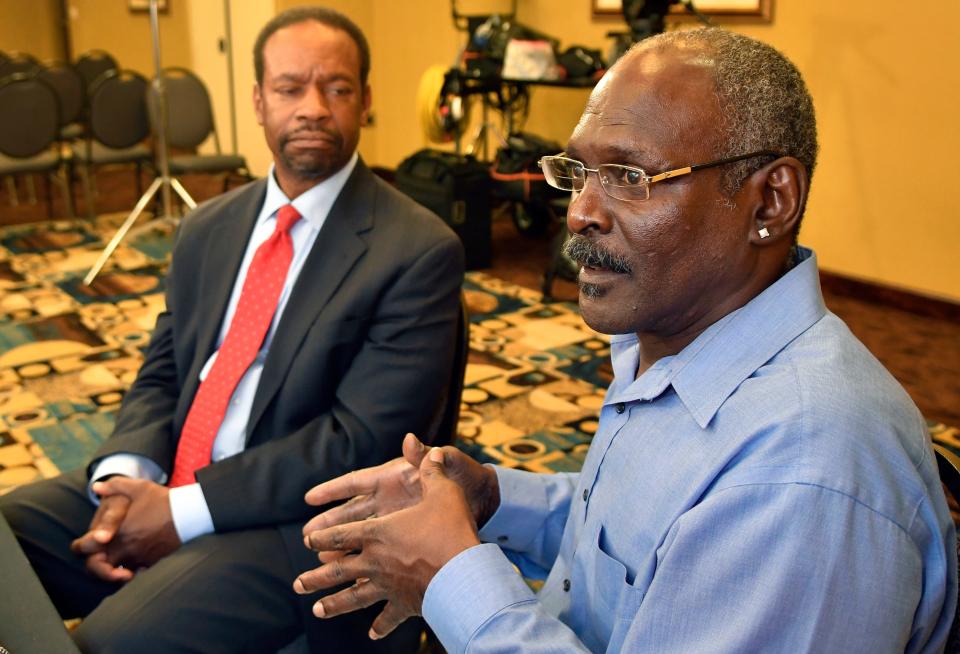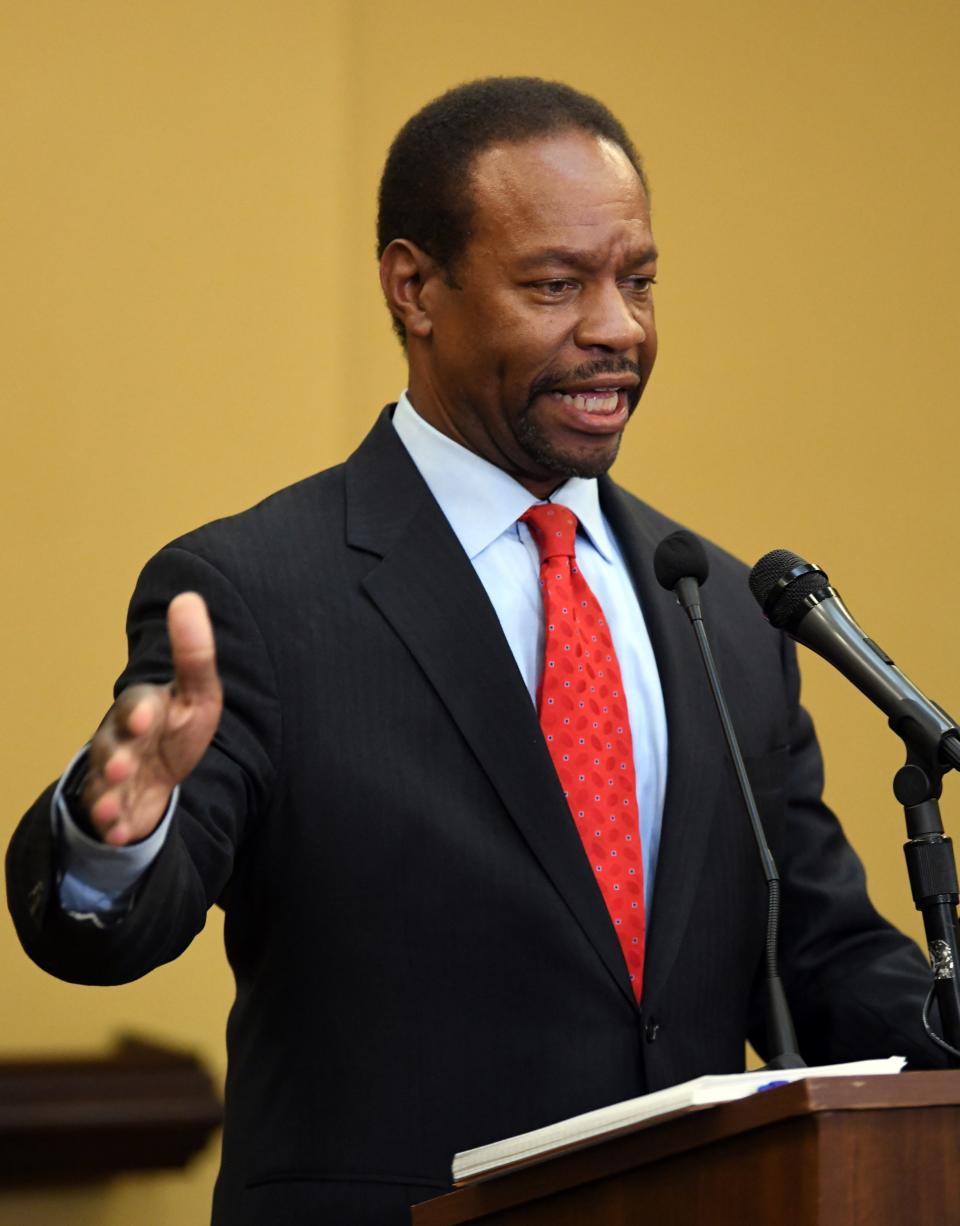Torres: Crosley Green's U.S. Supreme Court petition gains support | Opinion
The legal community has watched the Crosley Green situation closely for years.
I know this because I've heard from them. I've heard terms like outrage, befuddlement, incredulous and I've seen a lot of shaking heads over the case of the North Brevard man who spent more than 30 years in prison — including 20 years on death row — for a murder he didn't commit.
Now, as Green's quest for freedom reaches the U.S. Supreme Court, some major firms are doing more than watching and commenting from the sidelines. On Tuesday, Green's attorneys with Washington D.C.-based Crowell & Moring announced that four international law firms representing former judges, former prosecutors, law school professors and the bipartisan Due Process Institute, have filed or are filing amicus briefs this week in support of Green's petition seeking review before the U.S. Supreme Court.
Amicus brief?
That's when a person or group who is not involved in a legal case, offers to assist the Supreme Court by offering perspective, data, expertise and other insight.
The four groups (former prosecutors, former state-court judges, law professors and Due Process Institute) are being represented by four of the nation's top law firms. They are, respectively, Akerman, DLA Piper, Cozen O'Connor and Squire Patton Boggs.
“There is a surge of support to reverse the decision by the Court of Appeals and it is continuing to grow. We are very pleased to see the rapid response of so many prominent lawyers, including former prosecutors, state court judges, legal scholars and constitutional experts who understand the practical implications of this case for the legal system," said one of Green's attorneys, Jeane Thomas of Crowell & Moring. "We are hopeful that the Supreme Court will consider their compelling arguments.”
More on the Crosley Green case:Crosley Green's hope goes to the U.S. Supreme Court | Torres
Plus:Nearly out of options, an extraordinary man continues to believe in justice | Torres

I've been writing for six months that this case goes deeper than just Crosley Green. This case could have far-reaching repercussions for all criminal defendants in the United States.
This case is about making sure prosecutors do the right thing.
Hopefully the Supreme Court will agree with a lower federal court's 2018 ruling that Crosley Green's murder conviction should be vacated and the Titusville man set free because of a Brady violation. Prosecutor Chris White failed to disclose to Green's defense his notes that responding officers felt Green had nothing to do with the crime. The Brady doctrine requires prosecutors to turn over material exculpatory evidence to the defense before trial.
Green was convicted in 1990 of kidnapping 22-year-old Charles "Chip" Flynn and his girlfriend Kim Hallock and driving them to an orange grove where he and Flynn proceeded to have a shootout, allowing Hallock to escape.
In Green’s case, prosecutors withheld key evidence pointing to another suspect as officers even went as far as to implicate the victim's ex-girlfriend.
Green was convicted in 1990 of kidnapping 22-year-old Charles "Chip" Flynn and his girlfriend Kim Hallock and driving them to an orange grove where he and Flynn proceeded to have a shootout, allowing Hallock to escape. Flynn died of his injuries.
The notes stated that the officers “suspect the girl did it” and that she “changed her story a couple of times,” and they marshal the evidence supporting the officers’ conclusion, including the ex-girlfriend’s inconsistent statements about who tied the victim’s hands. The prosecutor’s notes were not turned over to the defense prior to trial.
Green's petition to the U.S. Supreme Court reads, in part:
“With no physical evidence tying Green to the crime, before an all-white jury with the sole eyewitness claiming a ‘black guy’ did it, [the girlfriend’s] credibility as well as the credibility of the police investigation was critical to the outcome of the trial. But the first two police officers on the scene knew the teenager’s claim that a ‘black guy did it’ was nothing more than a hoax.”
In 2018 U.S. District Court Judge Roy B. Dalton Jr. of the Middle District of Florida agreed and granted Green his freedom or a new trial. He wrote of the importance of the notes in his ruling: “it is difficult to conceive of information more material to the defense… than the fact that the initial responding officers evaluated the totality of evidence as suggesting that the investigation should be directed toward someone other than [Green].”
But the State of Florida appealed, and the 11th Circuit Court of Appeals reversed Green’s victory last year, ruling that prosecutors did not need to disclose exculpatory evidence to defense counsel because it would not have been admissible at trial and was not material to the outcome.
I think most jurors would think it was pretty dang material or important to hear the responding officers say they felt Green had nothing to do with the shooting at all.
There are other major problems with this case including accusations that prosecutors coerced and threatened witnesses, who later recanted their testimony, a junk science dog track, a prejudiced photo lineup, and the fact that Green did not know how to drive a stick-shift vehicle he allegedly commandeered, among other issues. But Green's fight for freedom hinges now on the notes not turned over by the prosecutor.
I would think that the fact that two of the groups filing an amicus are former prosecutors and former judges carries a lot of weight in a case like this. Attorney Jeane Thomas agrees.
“It is extraordinary to see the prominent individuals and organizations who are raising their voices for Crosley and to protect fundamental principles of our system of justice," she said. "Former prosecutors, former state court judges, law professors, and others from across the political spectrum are united in their view that the incorrect decision by the Court of Appeals will have a damaging ripple effect on the American justice system if the Supreme Court does not take this case and reverse the decision. This case has always been about having a fair chance to prove Crosley’s innocence, and now it is also about whether an outlier interpretation of the U.S. Constitution will be permitted to govern the justice system in the Deep South.”

When the 11th Circuit Court of Appeals last year overturned the 2018 ruling, they acknowledged the information from the responding officers should have been turned over to the defense but also said it was not material to the case.
Prosecutors should not be allowed to make that call, to decide what evidence would matter. The bottom line is that the decision by the 11th Circuit Court of Appeals will have the undesired effect of keeping innocent people in prison.
University of Florida law professor Kenneth Nunn is part of the law professor group filing the amicus brief being crafted by Cozen O'Connor.
“We are a group of law professors who either provide pro bono services in the criminal area or who teach criminal law, criminal procedure, or constitutional law. We are filing this amicus brief because we belief the Eleventh Circuit has crafted an unreasonable restriction on habeas relief that will make it harder for persons who claim innocence to have their reviewed by federal courts.”
Green was conditionally released in 2021, pending the appellate process. He works full-time and is allowed to leave his house for work, groceries, doctor's appointments and church. If his petition to the U.S. Supreme Court is unsuccessful, he may have to return to prison at the age of 65 to finish his life sentence. Green has been eligible for parole for many years and has a spotless prison record but he would have to acknowledge his guilt, something he refuses to do.
Crowell & Moring has represented Green pro bono since 2008. The team includes Crowell & Moring partners Keith J. Harrison, Jeane A. Thomas, Vincent J. Galluzzo, and counsel Drake Morgan.
Contact Torres at jtorres@floridatoday.com. You can follow him on Twitter @johnalbertorres or on Facebook at facebook.com/FTjohntorres.
Support local journalism and become a subscriber. Visit floridatoday.com/subscribe
This article originally appeared on Florida Today: Crosley Green quest for freedom gains more legal support

